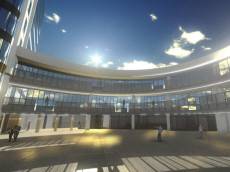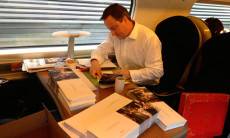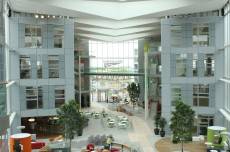November 5, 2013
Interview: Greg Lindsay on engineering serendipity and harnessing chaos
Greg Lindsay is a journalist and urbanist. He is a contributing writer for Fast Company and co-author of the international bestseller Aerotropolis: The Way We’ll Live Next as well as a visiting scholar at New York University’s Rudin Center for Transportation Policy & Management, a senior fellow of the World Policy Institute, and a research affiliate of the New England Complex Systems Institute. He is also one of the main speakers at this year’s Worktech conference in London on 19 and 20 November. In this frank and enlightening interview he offers his thoughts on how firms can engineer serendipity into their workplaces and cultures and how the way we design offices is already taking clues from the way we plan urban environments.











 The finest closing sentence of any novel in my opinion is that in The Great Gatsby. “So we beat on, boats against the current, borne back ceaselessly into the past.” It is a reference to the futility of our attempts to escape the past, even as we look to the future, dreaming of how “tomorrow we will run faster, stretch out our arms farther”. F Scott Fitzgerald was referring to people when he wrote it, and Jay Gatsby in particular, but it’s a passage that resonates in a number of ways, especially in those areas of our lives that deal most intimately with what it means to be human. And one of these is self-evidently the workplace, where any articular attempt to define the ideal office for a particular time, including the future, is complicated by the fact that we must always meet the needs of the beasts that inhabit it. Regardless of the tools we have at our disposal with which to work more effectively, or just plain ‘more’ we remain fundamentally the same animals we were thousands of years ago.
The finest closing sentence of any novel in my opinion is that in The Great Gatsby. “So we beat on, boats against the current, borne back ceaselessly into the past.” It is a reference to the futility of our attempts to escape the past, even as we look to the future, dreaming of how “tomorrow we will run faster, stretch out our arms farther”. F Scott Fitzgerald was referring to people when he wrote it, and Jay Gatsby in particular, but it’s a passage that resonates in a number of ways, especially in those areas of our lives that deal most intimately with what it means to be human. And one of these is self-evidently the workplace, where any articular attempt to define the ideal office for a particular time, including the future, is complicated by the fact that we must always meet the needs of the beasts that inhabit it. Regardless of the tools we have at our disposal with which to work more effectively, or just plain ‘more’ we remain fundamentally the same animals we were thousands of years ago.

















November 5, 2013
Technology fix. What employers can do when social media becomes an addiction
by Pam Loch • Comment, Legal news, Technology, Workplace
Recent research shows that technology has helped us to become nearly five times more productive than we were in the 1970s. As well as enabling social interaction and personal expression, social media such as LinkedIn and Twitter can be valuable business aids for innovation and collaboration. However, with over half of people under 25 admitting they have to check Facebook at least once a day, it’s clear that for many, social media has become more than a form of virtual engagement. This can create something of an issue in the workplace, leaving employers with the dilemma of balancing the positive aspects of online communications while discouraging time wasting. More →